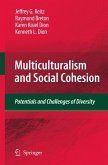Integration and Inequality in Educational Institutions
Herausgegeben:Windzio, Michael
Integration and Inequality in Educational Institutions
Herausgegeben:Windzio, Michael
- Broschiertes Buch
- Merkliste
- Auf die Merkliste
- Bewerten Bewerten
- Teilen
- Produkt teilen
- Produkterinnerung
- Produkterinnerung
This volume addresses questions that lie at the core of research into education. It examines the way in which the institutional embeddedness and the social and ethnic composition of students affect educational performance, skill formation, and behavioral outcomes. It discusses the manner in which educational institutions accomplish social integration. It poses the question of whether they can reduce social inequality, - or whether they even facilitate the transformation of heterogeneity into social inequality.Divided into five parts, the volume offers new insights into the many factors,…mehr
Andere Kunden interessierten sich auch für
![Multiculturalism and Social Cohesion Multiculturalism and Social Cohesion]() Jeffrey G. ReitzMulticulturalism and Social Cohesion100,99 €
Jeffrey G. ReitzMulticulturalism and Social Cohesion100,99 €![Collective Choice in Education Collective Choice in Education]() M. J. BowmanCollective Choice in Education83,99 €
M. J. BowmanCollective Choice in Education83,99 €![Freedom and School Choice in American Education Freedom and School Choice in American Education]() Freedom and School Choice in American Education41,99 €
Freedom and School Choice in American Education41,99 €![Freedom and School Choice in American Education Freedom and School Choice in American Education]() Freedom and School Choice in American Education41,99 €
Freedom and School Choice in American Education41,99 €![School Choice School Choice]() David R. GarciaSchool Choice15,99 €
David R. GarciaSchool Choice15,99 €![Governance and Choice of Upper Secondary Education in the Nordic Countries Governance and Choice of Upper Secondary Education in the Nordic Countries]() Governance and Choice of Upper Secondary Education in the Nordic Countries81,99 €
Governance and Choice of Upper Secondary Education in the Nordic Countries81,99 €![Governance and Choice of Upper Secondary Education in the Nordic Countries Governance and Choice of Upper Secondary Education in the Nordic Countries]() Governance and Choice of Upper Secondary Education in the Nordic Countries81,99 €
Governance and Choice of Upper Secondary Education in the Nordic Countries81,99 €-
-
-
This volume addresses questions that lie at the core of research into education. It examines the way in which the institutional embeddedness and the social and ethnic composition of students affect educational performance, skill formation, and behavioral outcomes. It discusses the manner in which educational institutions accomplish social integration. It poses the question of whether they can reduce social inequality, - or whether they even facilitate the transformation of heterogeneity into social inequality.Divided into five parts, the volume offers new insights into the many factors, processes and policies that affect performance levels and social inequality in educational institutions. It presents current empirical work on social processes in educational institutions and their outcomes. While its main focus is on the primary and secondary level of education and on occupational training, the book also presents analyses of institutional effects on transitions from vocational training into tertiary educational institutions in an interdisciplinary and internationally comparative approach.
Produktdetails
- Produktdetails
- Verlag: Springer / Springer Netherlands
- Artikelnr. des Verlages: 978-94-017-8398-9
- 2013
- Seitenzahl: 320
- Erscheinungstermin: 12. April 2015
- Englisch
- Abmessung: 235mm x 155mm x 18mm
- Gewicht: 488g
- ISBN-13: 9789401783989
- ISBN-10: 9401783985
- Artikelnr.: 42578160
- Herstellerkennzeichnung Die Herstellerinformationen sind derzeit nicht verfügbar.
- Verlag: Springer / Springer Netherlands
- Artikelnr. des Verlages: 978-94-017-8398-9
- 2013
- Seitenzahl: 320
- Erscheinungstermin: 12. April 2015
- Englisch
- Abmessung: 235mm x 155mm x 18mm
- Gewicht: 488g
- ISBN-13: 9789401783989
- ISBN-10: 9401783985
- Artikelnr.: 42578160
- Herstellerkennzeichnung Die Herstellerinformationen sind derzeit nicht verfügbar.
Michael Windzio ist wissenschaftlicher Assistent am Institut für empirische und angewandte Soziologie (EMPAS) der Universität Bremen.
Foreword .- Introduction 1. Integration and Inequality in Educational Institutions: An Institutional Perspective by Michael Windzio .- Education and Society 2. Integration and the Education State. Institutional History and Public Discourse in England, France, Germany, and the US by Ansgar Weymann .- Institutions and educational outcomes in a comparative perspective 3. The School Performance of the Russian-Speaking Minority in Linguistically Divided Educational Systems: A Comparison of Estonia and Latvia by Kristina Lindemann .- 4. Positive but also negative effects of ethnic diversity in schools on educational performance? An empirical test using PISA data by Jaap Dronkers & Rolf van der Velden .- 5. Socio-Structural Effects on Educational Poverty of Young Immigrants - An International Comparative Perspective by Janna Teltemann & Michael Windzio .- 6. School Accountability, Autonomy, Choice and the Equality of Educational Opportunities by Gabriela Schuetz, Elke Luedemann, Martin R. West & Ludger Woessmann .- 7. Consequences of Changing Education Policies on Social Inequality - The Case of Japan - by Masashi Urabe, Ayumi Ono & Sherlyne Almonte Acosta .- Social networks and social capital in schools and classrooms 8. School Class Composition and Student Development in Cognitive and Non-Cognitive Domains: Longitudinal Analyses of Primary School Students in Germany by Thorsten Schneider .- 9. Immigrant Children's Access to Social Capital in School-Class Networks by Michael Windzio .- 10. Social discrimination in Classrooms. The Contribution of a Social Networks Approach to Theory and Methods, andEmpirical Evidence by Chris Baerveldt .- 11. School interconnectedness and school inequality as determinants of the ethnic gap in violent behavior by Dirk Baier .- 12. Friendships of delinquent and non-delinquent adolescents in classrooms by Andrea Knecht .- Institutionalized transitions into and out of vocational training 13. Immigrants in the German Vocational Training System - A Closer Look at Young People with Low Educational Credentials by Can Aybek .- 14. New Institutional Linkages between Dual Vocational Training and Higher Education - A Comparative Analysis of Germany, Austria and Switzerland by Christian Ebner, Lukas Graf & Rita Nikolai .- 15. Conclusion: Institutional Effects on Integration and Inequality by Michael Windzio.& Sherlyne Almonte Acosta .- Social networks and social capital in schools and classrooms 8. School Class Composition and Student Development in Cognitive and Non-Cognitive Domains: Longitudinal Analyses of Primary School Students in Germany by Thorsten Schneider .- 9. Immigrant Children's Access to Social Capital in School-Class Networks by Michael Windzio .- 10. Social discrimination in Classrooms. The Contribution of a Social Networks Approach to Theory and Methods, and Empirical Evidence by Chris Baerveldt .- 11. School interconnectedness and school inequality as determinants of the ethnic gap in violent behavior by Dirk Baier .- 12. Friendships of delinquent and non-delinquent adolescents in classrooms by Andrea Knecht .- Institutionalized transitions into and out of vocational training 13. Immigrants in the German Vocational Training System - A Closer Look at Young People with Low Educational Credentials by Can Aybek .- 14. New Institutional Linkages between Dual Vocational Training andHigher Education - A Comparative Analysis of Germany, Austria and Switzerland by Christian Ebner, Lukas Graf & Rita Nikolai .- 15. Conclusion: Institutional Effects on Integration and Inequality by Michael Windzio.
Foreword .- Introduction 1. Integration and Inequality in Educational Institutions: An Institutional Perspective by Michael Windzio .- Education and Society 2. Integration and the Education State. Institutional History and Public Discourse in England, France, Germany, and the US by Ansgar Weymann .- Institutions and educational outcomes in a comparative perspective 3. The School Performance of the Russian-Speaking Minority in Linguistically Divided Educational Systems: A Comparison of Estonia and Latvia by Kristina Lindemann .- 4. Positive but also negative effects of ethnic diversity in schools on educational performance? An empirical test using PISA data by Jaap Dronkers & Rolf van der Velden .- 5. Socio-Structural Effects on Educational Poverty of Young Immigrants - An International Comparative Perspective by Janna Teltemann & Michael Windzio .- 6. School Accountability, Autonomy, Choice and the Equality of Educational Opportunities by Gabriela Schuetz, Elke Luedemann, Martin R. West & Ludger Woessmann .- 7. Consequences of Changing Education Policies on Social Inequality - The Case of Japan - by Masashi Urabe, Ayumi Ono & Sherlyne Almonte Acosta .- Social networks and social capital in schools and classrooms 8. School Class Composition and Student Development in Cognitive and Non-Cognitive Domains: Longitudinal Analyses of Primary School Students in Germany by Thorsten Schneider .- 9. Immigrant Children's Access to Social Capital in School-Class Networks by Michael Windzio .- 10. Social discrimination in Classrooms. The Contribution of a Social Networks Approach to Theory and Methods, andEmpirical Evidence by Chris Baerveldt .- 11. School interconnectedness and school inequality as determinants of the ethnic gap in violent behavior by Dirk Baier .- 12. Friendships of delinquent and non-delinquent adolescents in classrooms by Andrea Knecht .- Institutionalized transitions into and out of vocational training 13. Immigrants in the German Vocational Training System - A Closer Look at Young People with Low Educational Credentials by Can Aybek .- 14. New Institutional Linkages between Dual Vocational Training and Higher Education - A Comparative Analysis of Germany, Austria and Switzerland by Christian Ebner, Lukas Graf & Rita Nikolai .- 15. Conclusion: Institutional Effects on Integration and Inequality by Michael Windzio.& Sherlyne Almonte Acosta .- Social networks and social capital in schools and classrooms 8. School Class Composition and Student Development in Cognitive and Non-Cognitive Domains: Longitudinal Analyses of Primary School Students in Germany by Thorsten Schneider .- 9. Immigrant Children's Access to Social Capital in School-Class Networks by Michael Windzio .- 10. Social discrimination in Classrooms. The Contribution of a Social Networks Approach to Theory and Methods, and Empirical Evidence by Chris Baerveldt .- 11. School interconnectedness and school inequality as determinants of the ethnic gap in violent behavior by Dirk Baier .- 12. Friendships of delinquent and non-delinquent adolescents in classrooms by Andrea Knecht .- Institutionalized transitions into and out of vocational training 13. Immigrants in the German Vocational Training System - A Closer Look at Young People with Low Educational Credentials by Can Aybek .- 14. New Institutional Linkages between Dual Vocational Training andHigher Education - A Comparative Analysis of Germany, Austria and Switzerland by Christian Ebner, Lukas Graf & Rita Nikolai .- 15. Conclusion: Institutional Effects on Integration and Inequality by Michael Windzio.








